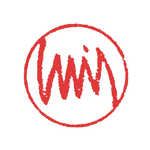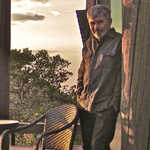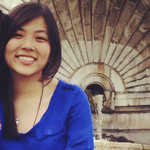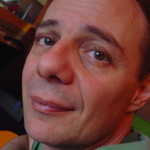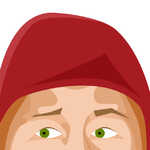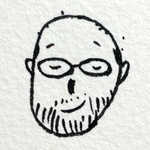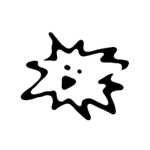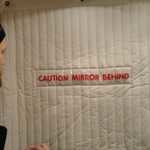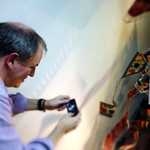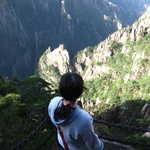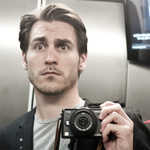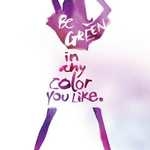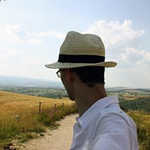

"I'm from Libya," he said. I don't know what to say. It's as if he'd told me he'd just come from his father's funeral.
November 15th, 2014, 8pm
It was 15°C with few clouds. The breeze was gentle.
There are places whose names have a palpably tragic resonance; places you only know from the news, places that you saw plastered across front pages, gouged heads dripping blood, F16s swooping over heat-warped horizons.
I feel like I should offer my condolences. But then I wonder if that would be patronising. Perhaps I should talk about something else, like Libyan food, given we are in a restaurant (Egyptian). Or would that be offensively inane?
My paralysed silence continues for a few seconds while I consider something intelligent, empathetic, well-informed with which to respond. An image of a kohl-eyed Gaddafi is cavorting in my head. A faint memory of a colleague working as a stringer in Libya. Didn’t I work with a Libyan woman once? No, wait: she was from Syria.
I am aware I haven’t said anything yet.
This is the problem with asking where someone is from: our knowledge of most of the world is extremely limited: wide and shallow at best and simply non-existent for large swathes of the globe. We rely on a snatched patchwork of media images to construct simplistic impressions in our head. When I consider this, the default reaction from Japanese people when I tell them I’m English - “HARRY POTTER! DAVID BECKHAM!” - seems like a considered response.
But I’m a journalist - or a lapsed one - and so I feel embarrassed at my lack of knowledge. I’m struggling in my head to differentiate the Libyan narrative from that of Syria, Tunisia, Algeria. The Middle East and North Africa are areas that I have consciously turned away from in my necessarily selective news reading habits: you have to go deep or stay clear.
I decide my best strategy is to be curious.
“What is Libya like now?”
“It’s a mess,” he says.
Zacchariah - as he is called - tells me that Libya wasn’t part of the “Arab Spring”, the term itself an invention of the Western media. It was a peaceful, educated, cosmopolitan country. Gaddafi wasn’t a dictator; he was their leader for 42 years because they wanted him to be. Everything was free: education, healthcare. People had wealth and liberty to do as they pleased.
But NATO wanted their oil and gas - “This is a compromise we have had to think about. Allah blessed us with these natural reserves but they led to our destruction” - and so the United States and Europe created propaganda that depicted Gaddafi as an incompetent, socialist loon. They constructed a repressed underground opposition in need of salvation - and air strikes.
The NATO bombings killed 40,000 people on the first night. “You can’t even imagine. Everything gone. The buildings, gone, dust. They destroyed everything. And this went on for a year.”
When I ask who is in power now, Zaccharia waves his hand dismissively. It doesn’t matter.
“They brought in this - what do you call it, when you have two parties? Like the Democrats and the Republicans? - this system to Libya. It didn’t fit, though. We had a different system of democracy. There are probably 70 parties, factions. The idea of a ruling party and an opposition is something that only works in Europe, America.”
This is what you expect to hear: the media is full of lies. America goes to war because it wants oil. The two-party system is a foreign imposition. It’s a line as tired as its opposite, the mainstream doctrine. And yet hearing it directly from a doctor who left Libya ten years ago and has worked in Italy, China and Japan, makes it seem indisputable.
I apologise for my lack of knowledge and misguided tendency to lump Libya together with its neighbours. I even do it with food: I often gush about how much I love “Middle Eastern food” while aware it’s an arbitrary a category as “European cuisine”. Is it really all lakes of hummus and baba ghanoush and endless lamb kebabs?
“Actually, we eat a lot of spaghetti and pizza - a legacy of the Italian colonists,” he says.
“No prosciutto, though, right?”
He laughs.
He teaches us to count in Arabic (waahid, ithnaan, thalaatha), showing how the numbers were written to count their angles. Zero - 0. No angles. One - 1. See the triangle you can draw from the hat to the stalk? All the way to 8, written like on a digital alarm clock, eight ninety-degree angles inside the two boxes. So clever.
In London, where Arabic is perhaps the third or fourth most common language and you can eat in a restaurant exclusively staffed by people from outside the EU, I might not ask a man sitting in a cafe where he’s from, and he might not so easily volunteer his opinions on politics. But in Japan, it’s easy to adopt the categorisation that is impressed upon you - “non-Japanese” and feel that those in the same boat are somehow closer, more approachable. You can spark up conversations in a very non-Japanese way: cut straight to the chase, jump from topic to topic, delve into politics and religion. After an hour of talking, he pays me what I now consider a compliment, knowing my home country’s reputation for being chilly and reserved.
“You’re not very English, are you?”
Filed Under
Other moments in Tokyo
-
The first specialty coffee shop in Ikebukuro and Junkudo (bookstore) resonate.
in Tokyo, Japan -
film, edit
Editing is interpreting.
in Tokyo, Japan -
The Riddle of Steel.
in Tokyo, Japan -
Commutes, Cities, Underground
The man stands motionless in a crush of white-shirted salarymen, as they swarm past him, toward the single escalator.
in Tokyo, Japan -
Reve, japan, Centre commercial piscine
Rêve de centre commercial-piscine
in Tokyo, Japan -
Urban Nature, birds
Sparrow Noise
in Tokyo, Japan -
City walks
Birthday walk home
in Tokyo, Japan -
Dead Letter, Addiction
"Dear Cigarettes"
in Tokyo, Japan -
Letters, Dead Letter
Dead Letter#2: Names
in Tokyo, Japan
